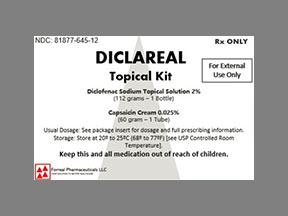
Diclareal Coupons & Savings Card – Discount Prices from $3583.47
My prescription
Edit
172GM of 2 & 0.025%, Diclareal (1 Box)
Select pharmacy

CVS
$3583.47
COUPON PRICE
Walmart
$3932.24
COUPON PRICE
Albertsons
$3935.89
COUPON PRICE
Walgreens
$3943.23
COUPON PRICEDiclareal savings card
Show this card to your pharmacist
CVS
$3583.47
BIN
ID
PCN
GRP
019876
LH22B6620E
CHIPPO
LHX
Powered by
Price history for Diclareal
1 Box, 172GM of 2 & 0.025%
Average retail price for Diclareal
Average SaveHealth price for Diclareal
Our price history data is based on aggregated prescription data collected from participating pharmacies in America. Our prescription data updates daily to reflect the latest price changes. If you notice a missing data point, it means there wasn't sufficient data available to generate a monetary value for that date.
*Retail prices are based on pharmacy claims data, and may not be accurate when we don't have enough claims.
Diclareal dosage forms
Dosage Quantity Price from Per unit 172GM of 2 & 0.025% 1 Box $3583.47 $3583.47 172GM of 2 & 0.025% 2 Boxes $7148.64 $3574.32 172GM of 2 & 0.025% 3 Boxes $10713.81 $3571.27
| Dosage | Quantity | Price from | Per unit |
|---|---|---|---|
| 172GM of 2 & 0.025% | 1 Box | $3583.47 | $3583.47 |
| 172GM of 2 & 0.025% | 2 Boxes | $7148.64 | $3574.32 |
| 172GM of 2 & 0.025% | 3 Boxes | $10713.81 | $3571.27 |
Using the SaveHealth discount card, what is the price of Diclareal without insurance?
Using the SaveHealth discount card, the price of Diclareal without insurance is $3583.47.
What is the price of Diclareal at CVS?
The price of Diclareal at CVS is $3583.47.
What is the price of Diclareal at Walgreens?
The price of Diclareal at Walgreens is $3943.23.
What is the price of Diclareal at Walmart?
The price of Diclareal at Walmart is $3932.24.
